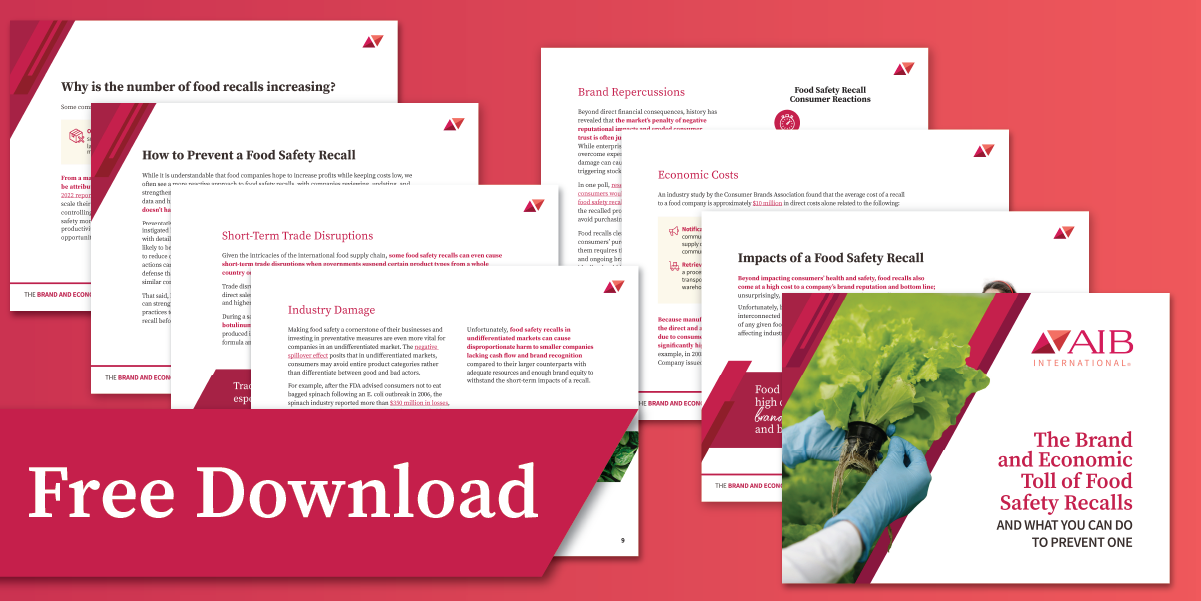3 Tips for Implementing an Internal Food Safety Audit That Complies With GFSI Requirements [Free Download]
The world’s food supply has become increasingly interconnected, and so has the world’s food safety system. That’s where the Global Food Safety Initiative (GFSI) comes in.
A collaboration between international leading food safety experts, GFSI launched at the turn of the millennium to ensure continuous improvement in food safety management systems and to unify food safety regulations across the globe. These standards not only support the production of safe food, but they also facilitate international trade by improving regulatory alignment and consumer trust.
One of the best ways for a food company to maintain high food safety is by adopting GFSI standards — even if they don’t have an international footprint. Regardless of which GFSI certification program your company relies on — BRCGS, FSSC, IFS, or SQF — they all require internal food safety audit management.
How to Implement an Internal Food Safety Audit System
Internal food safety audits are a vital element of any food safety management system. More in-depth compared to a general GMP inspection or critical control point verification, audits can help you identify risks in your facility before they become serious threats to your business.
However, developing a comprehensive and effective internal food safety audit management system can be challenging if you don’t know where to start. Here are three tips to help you not only comply with GFSI requirements but also protect consumers and your brand in the long run.
1. Form and train your internal food safety audit team
Before you can execute an internal food safety audit, you must first assemble a team of auditors. This team shouldn't have conflicts of interest, so be sure to assign auditors who don't oversee the area or process being audited.
Once you’ve formed your team, it’s crucial to dedicate resources toward training them. Invest in programs that teach internal auditors how to
- Establish an audit protocol by understanding the auditing process and methodology
- Maintain and manage internal audit records, schedules, and procedures
- Detect, correct, and mitigate potential risks and nonconformances
- Implement appropriate corrective actions
A training course ensures that everyone uses the same approaches and techniques, and understands how internal audits contribute to overall food safety. Formal training can also prevent internal auditors from asking leading, open-ended, or ambiguous questions, giving them the skills needed to be objective, respectful, and professional when interviewing facility workers.
To maximize the impact of internal food safety audits, consider going beyond a one-off training session; instead, provide the internal audit team with ongoing food safety resources and courses. Auditors who are up to date on the latest developments in food safety regulations and trends will be able to perform better audits and identify issues that could compromise food safety.
2. Create an internal food safety auditing schedule
An internal auditing schedule is the basis of any food safety audit plan. Not only does it guarantee audits are conducted on time and consistently throughout the year, but it also provides an opportunity for you to define the scope of every food safety audit.
Determine the frequency of your internal food safety audits according to your facility’s risk level, as well as findings from prior audits. For example, if a particular process has more issues, you’ll want to boost the frequency of internal audits. Similarly, you’ll want to audit areas where you’ve implemented corrective actions to ensure that your leadership team and staff have successfully addressed all non-conformances.
3. Formalize the internal food safety auditing process
You should always manage an internal food safety audit as an independent program with its own procedures, cross-department representation, and analysis reporting.
Here are some steps to help you formalize the internal food safety auditing process:
- Prepare a comprehensive checklist that includes facility-specific questions.
- Document inspections with detailed descriptions and photographic evidence for evaluations against standard requirements. Do not allow auditors to simply check a “complies” or “does not comply” box.
- Complete a non-conformity report, which should include deadlines and assigned responsibilities for conducting root cause analysis and developing corrective action plans.
- Schedule a findings meeting with appropriate department managers.
Master Internal Food Safety Audits With AIB International
One of the most common reasons a company is not GFSI noncompliant is because they lack a properly designed or implemented internal food safety audit program. Beyond compliance, internal food safety audits allow you to take corrective actions before problems occur, protecting your company from the financial and brand damage that unsafe practices could inadvertently cause.
Looking for a comprehensive training program that satisfies the GFSI internal auditing requirements? Learn more in the AIB International GFSI Internal Auditing Private Training.

![3 Tips for Implementing an Internal Food Safety Audit That Complies With GFSI Requirements [Free Download]](https://blog.aibinternational.com/hubfs/blog_Recall.jpg)

